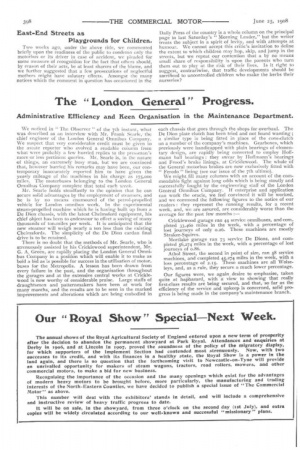The " London General " Progress.
Page 2

If you've noticed an error in this article please click here to report it so we can fix it.
Administrative Efficiency and Keen Organisation in the Maintenance Department.
Wc noticed in " The Observer " of the 7th instant, what was described as an interview with Mr. Frank Searle, the chief engineer of the London General Omnibus Company. We suspect that very considerable credit must be given to the astute reporter who evolved a readable column from what were probably a few hurried replies to the pressman's more or less pertinent queries. Mr. Searle is, in the nature of things, an extremely busy man, but we are convinced that, however hurried his remarks may have been, our contemporary inaccurately reported him to have given the yearly mileage of the machines in his charge as 175,000 miles. The motorbuses; belonging to the London General Omnibus Company complete that total each week.
Mr. Searle holds steadfastly to the opinion that he can secure solid advantages by the employment of steamers, and he is by no means enamoured of the petrol-propelled vehicle for London omnibus work. In the experimental steam-propelled machine which he is having built up from a De Dion chassis, with the latest Chelmsford equipment, his chief object has been to endeavour to effect a saving of many thousands of ton-miles per week. It is anticipated that the new steamer will weigh nearly a ton less than the existing Chelmsfords. The simplicity of the De Dion cardan final drive is to be retained.
There is no doubt that the methods of Mr. Searle, who is strenuously assisted by his Cricklewood superintendent, Mr. G. A. Green, are rapidly placing the London General Omnibus Company in a position which will enable it to make as hold a bid as is possible for success in the utilisation of motor_ buses for the Metropolis. A lesson has been drawn from every failure in the past, and the organisation throughout the garages and at the extensive central works at Cricklewood is now worthy of considerable praise. Large staffs of draughtsmen and patternmakers have been at work for many months, and the results are to be seen in the marked improvements and alterations which are being embodied in
each chassis that goes through the shops for overhaul. The De Dion plate clutch has been tried and not found wanting ; a similar type is being fitted in place of the cone-clutch on a number of the company's machines. Gearboxes, which previously were handicapped with plain bearings of elementary design, are rapidly being converted to employ Hoffmann bail bearings : they swear by Hoffmann's bearings and Froocl's brake linings, at Cricklewood. The whole of the General motorbus brakes are now exclusively fitted with " Ferodo " lining (see our issue of the 7th ultimo).
We might. fill many columns with an account of the commendable fight against long odds which is being stoutly and successfully fought by the engineering staff of the London General Omnibus Company. If enterprise and application can work the oracle, we feel convinced it will be worked, and we commend the following figures to the notice of our readers : they represent the running results, for a recent week, and, we are assured, are considerably worse than the average for the past few months :
Cricklewood garage ran 44 service omnibuses, and corn_ pleted 33,460 miles in the week, with a percentage of lost journeys of only 0.26. These machines are mostly Straker-Squires. Mortlake garage ran 73 service De Dions, and completed 56,274 miles in the week, with a percentage of lost journeys of o.86.
Athol Street, the second in point of size, ran 58 service machines, and completed 45,274 miles in the week, with a loss percentage of 2.15. These machines are all Wolseleys, and, as a rule, they secure a much lower percentage.
Our figures were, we again . desire to emphasise, taken quite at haphazard, with aview to showing that really first-class results are being secured, and that, so far as the efficiency of the service and upkeep is concerned, solid•progress is being made in the company's maintenance branch.


















